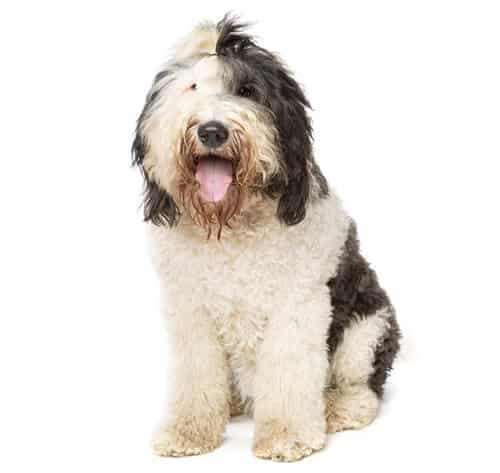What is a Sheepadoodle?
A Sheepadoodle is a designer dog breed that is a cross between a Standard Poodle and an Old English Sheepdog. A Miniature Sheepadoodle is a crossbreed between a mini poodle and an old English shepherd dog. A Sheepadoodle can be an F1 Sheepadoodle also called a Standard Sheepadoodle or an F1b Sheepadoodle. First-generation dogs are called “F1” because they’re the offspring of two purebreds (Old English Sheep Dog and Poodle). An F1b Sheepadoodle’s parents are a Sheepadoodle and a Poodle. They are sometimes mistaken for Shepards, but they’re not the same breed. A Shepadoodle is a cross between a Poodle and a German Shepherd.
Canis lupus familiaris
60 – 80 lbs
12 – 15 years.
Black and White Mix
Black
Gray
16 to 22 inches
Friendly
Outgoing
Playful

Temperament
Sheepadoodles look great both inside and outside. They’re usually incredibly friendly and absolutely adore their family members. Since they’re mixed with a poodle, there’s a good chance that their coats won’t shed too often. They’re friendly and outgoing, which makes them great fits for families. They’re not purebreds but they are recognized by some designer dog registries and clubs like the International Designer Dog Registry, American Canine Hybrids Club, etc. Besides making an excellent family pet, sheepdogs also make good therapy dogs.
Adaptability
A Sheepadoodle is an intelligent and active breed of dog who tends to be naturally friendly, calmer, and social. They usually get along well with other animals, including cats, birds, fish, etc. Sheepadoodle dogs tend to be expressive and intelligent. They appear to naturally understand when not to push too hard with young kids. In addition, they’ll keep you amused with their fun personalities, comic antics, and facial expressions. They are a combination of a companion and working dog that loves their family and is devoted to them.
Its moderate adaptability makes it good for most homes. Because of their exercise requirements, they’re often a good choice for people who live in houses with big backyards. You don’t need to worry if they’re going to be okay when you move into an apartment; just give them some serious exercise every single day. They prefer temperate weather conditions but can be found growing well in warmer temperatures too. Like most dogs, they’re sensitive to extremes of temperature. They enjoy having people around them because they feel loved and appreciated when others care for them.
Health
Since the Sheepadoodle is an amalgamation of two different dog breeds, they can inherit neither the health issues nor the good qualities of either of their parents’ breeds. There may be some potential health risks associated with having Sheepadoodles, including Cushing’s disease, Addison’s disease, certain types of cancers, joint swelling, joint pains, and bloating. However, these risks are rare. If you talk to the Sheepadoodle breeder about their breeding background and ask for proof of health clearances, you’ll be able to address any potential health issues before they become an issue.
Sheepadoodle Training
A Sheepadoodle is an extremely loyal pet who loves people unconditionally. They tend to be easygoing and flexible workers who adapt well to new situations. They may not always bark at strangers but if they see someone suspicious, they’ll definitely let us know. They’re often sensitive because they want the approval of their owner. If they’re not responding well to harsh criticism or if they become withdrawn when you use harsh language, then maybe it would be better for both of you to tone down your interactions so that neither one feels like he/she has been criticized Positively reinforced behaviors tend to be repeated again and again.
Grooming
A Sheepadoodle dog has different types of fur than a poodle. It may be wavy, straight, curly, or some mix of them all. Its color can range from black, brown, white, tan, red, blue, yellow This means you can have a Sheepadoodle that is black, brown, gray, white, or a mix of colors. Even though they may be low shedding, you’ll still need to brush your pet’s fur regularly to keep their coats clean and free from mats. Brush your Sheepadoodles’ coat regularly and have it professionally groomed every two months to maintain its health and appearance. They only need to be bathed as needed, so having it done while at the groomer is usually a good fit.
Apart from coat care, there’s another task every dog needs to keep them healthy. Regularly trimming fingernails, cleaning ears, and brushing teeth should be an integral part of your daily grooming routine. Trimming your dog’s nails keeps them from growing too long and causing pain or discomfort when walking. Most dogs don’t need their nails trimmed every month. You should also keep an eye out for any signs of ear infections, such as redness, swelling, discharge, or pain when cleaning your pet’s ears. If you have floppy ears, they’re more prone to trapping dirt, debris, and water, which could cause an infection. Regularly inspecting your dog’s ears for any signs of infection and keeping them clean by washing them out thoroughly at least once per week can prevent dogs from having an ear infection.
One of the most common health concerns for dogs is dental disease. Preventing common mistakes is often easier than trying to fix them after they’ve happened. If you implement good dental care for dogs by brushing their teeth regularly and giving them regular checkups, they’ll be less likely to develop tartar buildup and tooth decay. Brushing your dog’s teeth regularly, feeding him an appropriate diet, and giving him regular treats can all be part of preventing canine dental diseases. You may want to consider getting your dog used to having its mouth, paws, and ear touched when he’s young so that later on, grooming him won’t be such an ordeal for both you and your pet.
Physical Needs
A Sheepadoodle is an energetic dog breed. Exercise is essential for their health and happiness. They’re energetic and intelligent so they require lots of physical activity and mental stimulation to keep themselves from becoming bored. If they’re already doing something for you, then giving them a task to complete might be enough to keep them happy. Swimming with dogs tends to be fun for both them and us! As well as socializing, going for walks at the dog park might help keep us from feeling too energetic.
Because this is a mixed breed, height and size can vary a little based on the size of the parents. A Sheepadoodle usually stands from 13 to 27 inches tall and weighs between 45 and 80 pounds when fully grown. Mini Sheepadoodles usually stand under 20 inches tall and weigh anywhere from 24 to 44 pounds.
Sheepadoodle – Life Span
A Sheepadoodle will typically live 12 – 15 years.
Photo from Purina.co.uk
